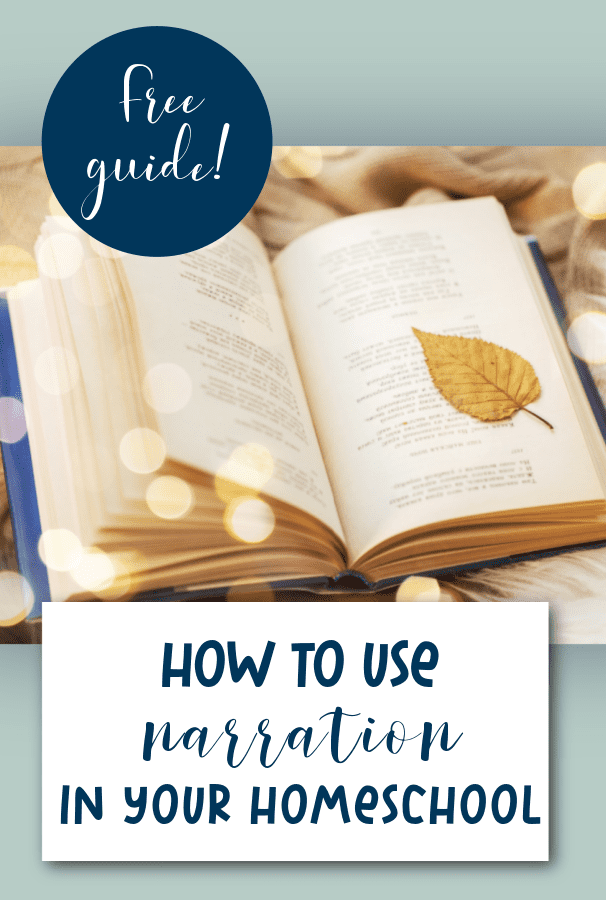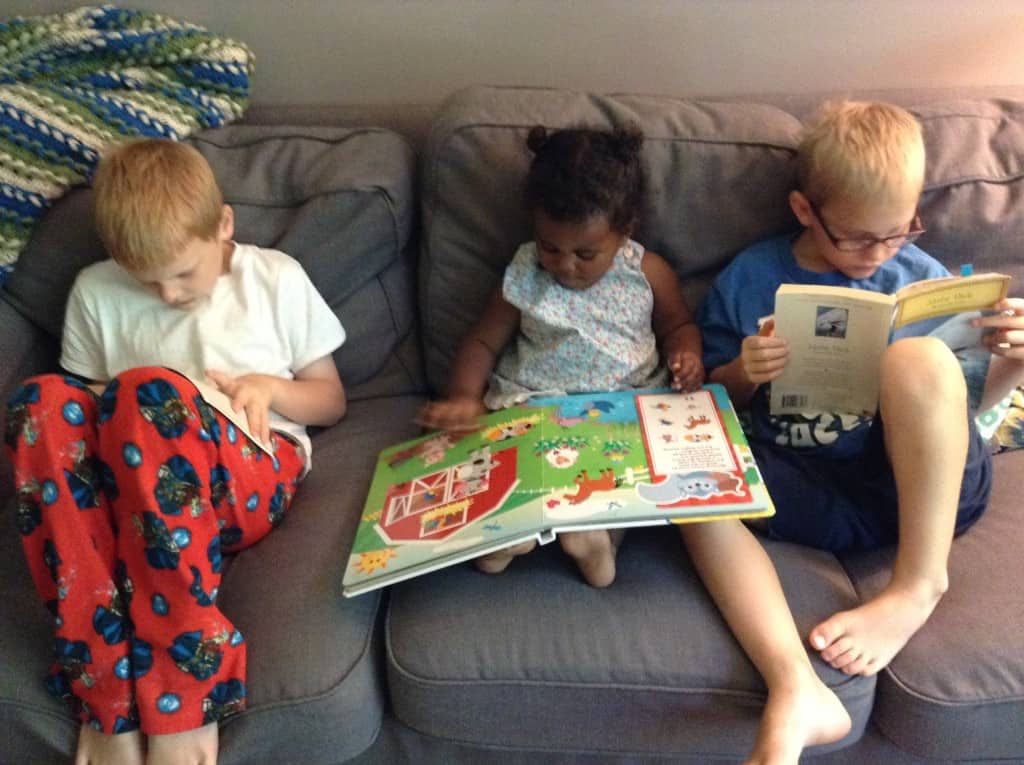We love using narration in our homeschool, especially in the younger grades. However, being a non-CM (Charlotte Mason) homeschooler, I can sometimes feel like I’m not adopting her methods perfectly. Like maybe I’m being judged by the strict CM homeschoolers. I know I’m not, but it’s still in the back of my mind.
So, if you’re intimidated to try narration because you haven’t adopted the whole Charlotte Mason philosophy and methodology into your homeschooling, then this post is for you.
Here’s narration for the rest of us.
Plus – be sure to download a narration cheatsheet and listen to episode 179 of the podcast below where we dive into why you should use narration and some tips for getting started.

My posts contains affiliate links.
What is narration?
A great place to start is the website Simply Charlotte Mason. Here’s how they define narration:
Considering what you read, pondering how it applies to other ideas you’ve gained, putting it into order, recalling details, mixing it with your opinion, and then forming those thoughts into coherent sentences and telling them to someone else is when real learning takes place
The beauty of narration is that it doesn’t take prep from mom, because once you learn how to guide your children through the process, and once they’ve had some practice with trying narration, it’s an easy method to use.
Best of all, narration engages the learner, who has to employ higher level thinking skills to complete the task. Win!
When can you use narration?
You can pull in narration chapter by chapter while your child is reading a book and it provides better assessment than a dry old book report.
You can also try it with any living books you have for your study of history or science. It’s also a great method for reading the Bible with children, young and old alike!

Who can use narration?
While narration is ideal at the younger grades, older students can see success with it as well.
Talkative children will find narration a natural fit for them, but you will also have the opportunity to help them learn to be concise and well-reasoned with their words.
Quieter or slower children will also be able to complete narrations much easier than taking comprehension quizzes or pointless worksheets to interact with the information.
Narration requests
- Tell me all you know about…
- Explain how…
- Describe our trip to the shore, nature walk, etc.
- Describe anything new you just learned from this chapter.
- Tell me five things you learned about…
- Tell back the story (passage, episode, chapter) in your own words.
- Ask or write six questions covering the material of this chapter (good for an older student).
- Draw a picture, map, or likeness of…
- What did you learn about (this person) in this chapter – fictional or real
Why is narration a good practice to use in homeschooling?
Narration provides an excellent way to assess learning without giving a “standard” test in the subject, which is probably filled with low level questions anyway. Charlotte Mason thought that grasping a concept of the whole is better than memorizing a list of irrelevant details.
Narration embraces the concept of mastery learning – which means you’re aiming for complete mastery before moving on to a higher level topic. The traditional way of learning is to get “at least” a passing grade before moving on. But if your student gets an 80% on the test, that means they didn’t understand 20% of the material! Is it actually good pedagogy to move on from there?
With narration, your student gives a satisfactory or unsatisfactory narration. If he doesn’t show satisfactory understanding, then you have the opportunity to find out where your student is lacking and help them gain mastery.
Practically speaking, how does narration in homeschool look?
How to start with a book in grades 2-3:
- Parent reads first chapter as a “freebie,” meaning no narration is required
- The following day, share the reading with the student and she will narrate the entire chapter
- All the other chapters can be read silently by the student and narrated
- One narration can be recorded neatly by mom, and the student will later copy it into her composition book over a period of three days
When helping your children give more accurate historical narrations, you could display important names, dates, and places for them to use. This would apply to science terminology as well in their science narrations.
Experiment with narration using a variety of books. It fits many different situations!
So there you have it. Narration for the rest of us! Is narration a part of your homeschool already or will you give it a try?
Listen to the podcast: Using narration in homeschool
In episode 179, I’ll talk through the big ideas in the first two chapters of Know and Tell: The Art of Narration by Karen Glass.
Resources mentioned in this episode:
Do you use a nature curriculum? You’ll LOVE Gentle + Classical Nature. Their curriculum will help you understand Charlotte Mason’s methods as well as teach your children aged K-4th grade. Check it out today, the Teacher’s Guide is 100% free!
What type of homeschooler are you? Grab our FREE Essential Guide to Homeschool Methods to learn about the pros and cons of different styles and which curriculum or approach lines up the best with each methodology.
Listen in to episode 177 where I explain why I’m an eclectic homeschooler.
Narration is a great solution if you’re looking for ways to homeschool on a tight budget. It also enables you to simplify your homeschooling by teaching multiple ages together.
Want to learn more about narration? Grab Karen’s book as part of your homeschool mom professional development and also download my recommendations for more books to add to your pile!
Listen to episode 30: Advice for Using Narration in Your Homeschool
Here’s an early podcast episode we did about narration! Give it a listen.
Listen to the podcast
More about narration
Do you use narration in your homeschool? It’s an easy-to-implement but powerful assessment and educational method that you can use TODAY.
Remember, when you’re homeschooling, you are able to basically tutor your child one-to-one. It is the best educational method ever! It’s more efficient than teaching a class of 25 kids. Plus, you are able to assess your student in natural ways, such as with narration, rather than merely resorting to standardized tests.
Some kids aren’t good test takers. But that shouldn’t hold them back in their education!
You’ll be surprised how easy it is to implement narration in your homeschool. It will give you immediate feedback on how much your kids grasp of the topic at hand, plus you will be able to then tailor your instruction and help based on the results of the narration.
Narration also provides a springboard to later writing assignments. If your kids can orally narrate through a topic or summary, then they will have a much easier time of putting those thoughts to paper later on.
Here’s a list of resources mentioned on today’s episode:
- Narration Cheatsheet
- Narration for Non-Charlotte Mason Homeschoolers
- HWM #17: Homeschooling Rocks Because of Immediate Feedback
- I don’t use printables (and you shouldn’t either)
Listen to Episode 211: Narration + Special Needs
Did you know that narration is an amazingly effective tool to use with kids with special needs? You may be surprised at how well narration helps your child with dyslexia or ADD. Learn more about this chapter from Karen Glass’ book Know and Tell: The Art of Narration.
Here’s episode 211 of the Homeschool with Moxie Podcast.
Resources mentioned in this episode:
- Know and Tell: The Art of Narration by Karen Glass
- Andrew Pudewa’s podcast from IEW about homeschooling his dyslexic son


